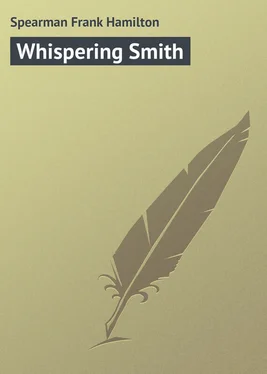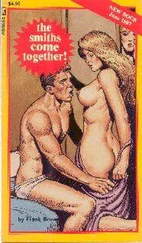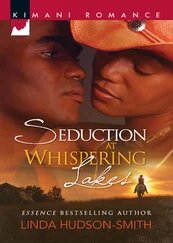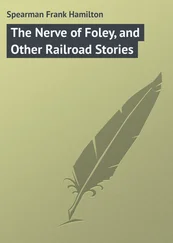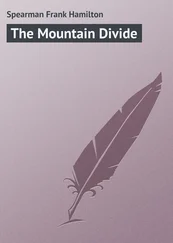Frank Spearman - Whispering Smith
Здесь есть возможность читать онлайн «Frank Spearman - Whispering Smith» — ознакомительный отрывок электронной книги совершенно бесплатно, а после прочтения отрывка купить полную версию. В некоторых случаях можно слушать аудио, скачать через торрент в формате fb2 и присутствует краткое содержание. Жанр: foreign_prose, foreign_adventure, на английском языке. Описание произведения, (предисловие) а так же отзывы посетителей доступны на портале библиотеки ЛибКат.
- Название:Whispering Smith
- Автор:
- Жанр:
- Год:неизвестен
- ISBN:нет данных
- Рейтинг книги:3 / 5. Голосов: 1
-
Избранное:Добавить в избранное
- Отзывы:
-
Ваша оценка:
- 60
- 1
- 2
- 3
- 4
- 5
Whispering Smith: краткое содержание, описание и аннотация
Предлагаем к чтению аннотацию, описание, краткое содержание или предисловие (зависит от того, что написал сам автор книги «Whispering Smith»). Если вы не нашли необходимую информацию о книге — напишите в комментариях, мы постараемся отыскать её.
Whispering Smith — читать онлайн ознакомительный отрывок
Ниже представлен текст книги, разбитый по страницам. Система сохранения места последней прочитанной страницы, позволяет с удобством читать онлайн бесплатно книгу «Whispering Smith», без необходимости каждый раз заново искать на чём Вы остановились. Поставьте закладку, и сможете в любой момент перейти на страницу, на которой закончили чтение.
Интервал:
Закладка:
“How do you do? What do you think? You’re going to have an old boarder back,” he cried. “I’m coming to Medicine Bend, superintendent of the division!”
“Mr. McCloud!” Marion Sinclair clasped her hands and dropped into a chair. “Have they made you superintendent already?”
“Well, I like that! Do you want them to wait till I’m gray-headed?”
Marion threw her hands to her own head. “Oh, don’t say anything about gray hairs. My head won’t bear inspection. But I can’t get over this promotion coming so soon–this whole big division! Well, I congratulate you very sincerely–”
“Oh, but that isn’t it! I suppose anybody will congratulate me. But where am I to board? Have you a cook? You know how I went from bad to worse after you left Cold Springs. May I have my meals here with you as I used to there?”
“Why, I suppose you can, yes, if you can stand the cooking. I have an apprentice, Mr. Dancing’s daughter, who does pretty well. She lives here with me, and is learning the business. But I sha’n’t take as much as you used to pay me, for I’m doing so much better down here.”
“Let me run that end of it, will you? I shall be doing better down here myself.”
They laughed as they bantered. Marion Sinclair wore gold spectacles, but they did not hide the delightful good-nature in her eyes. On the third finger of her slender left hand she wore, too, a gold band that explained the gray in her hair at twenty-six.
This was the wife of Murray Sinclair, whom he had brought to the mountains from her far-away Wisconsin home. Within a year he had broken her heart so far as it lay in him to do it, but he could not break her charm nor her spirit. She was too proud to go back, when forced to leave him, and had set about earning her own living in the country to which she had come as a bride. She put on spectacles, she mutilated her heavy brown hair and to escape notice and secure the obscurity that she craved, her name, Marion, became, over the door of her millinery shop and in her business, only “M. Sinclair.”
Cold Springs, where Sinclair had first brought her when he had headquarters there as foreman of bridges, had proved a hopeless place for the millinery business–at least, in the way that Marion ran it. The women that had husbands had no money to buy hats with, and the women without husbands wore gaudy headgear, and were of the kind that made Marion’s heart creep when they opened the shop door. What was worse, they were inclined to joke with her, as if there must be a community of interest between a deserted woman and women who had deserted womanhood. To this business Marion would not cater, and in consequence her millinery affairs sometimes approached collapse. She could, however, cook extraordinarily well, and, with the aid of a servant-maid, could always provide for a boarder or two–perhaps a railroad man or a mine superintendent to whom she could serve meals, and who, like all mountain men, were more than generous in their accounting with women. Among these standbys of hers was McCloud. McCloud had always been her friend, and when she left Cold Springs and moved to Medicine Bend to set up her little shop in Boney Street near Fort, she had lost him. Yet somehow, to compensate Marion for other cruel things in the mountains, Providence seemed to raise up a new friend for her wherever she went. In Medicine Bend she did not know a soul, but almost the first customer that walked into her shop–and she was a customer worth while–was Dicksie Dunning of the Crawling Stone.
CHAPTER V
THE CRAWLING STONE
Where the mountain chains of North America have been flung up into a continental divide, the country in many of its aspects is still terrible. In extent alone this mountain empire is grandiose. The swiftest transcontinental trains approaching its boundaries at night find night falling again before they have fairly penetrated it. Geologically severe, this region in geological store is the richest of the continent; physically forbidding beyond all other stretches of North America, the Barren Land alone excepted, in this region lie its gentlest valleys. Here the desert is most grotesque, and here are pastoral retreats the most secluded. It is the home of the Archean granite, and its basins are of a fathomless dust. Under its sagebrush wastes the skeletons of earth’s hugest mammals lie beside behemoth and the monsters of the deep. The eternal snow, the granite peak, the sandstone butte, the lava-bed, the gray desert, the far horizon are familiar here. With the sunniest and bluest of skies, this is the range of the deadliest storms, and its delightful summers contrast with the dreadest cold.
Here the desert of death simulates a field of cooling snow, green hills lie black in the dazzling light of day, limpid waters run green over arsenic stone, and sunset betricks the fantastic rock with column and capital and dome. Clouds burst here above arid wastes, and where dew is precious the skies are most prodigal in their downpour. If the torrent bed is dry, distrust it.
This vast mountain shed parts rivers whose waters find two oceans, and their valleys are the natural highways up which railroads wind to the crest of the continent. To the mountain engineer the waterway is the sphinx that holds in its silence the riddle of his success; with him lies the problem of providing a railway across ranges which often defy the hoofs of a horse.
The construction engineer studies the course of the mountain water. The water is both his ally and his enemy–ally because it alone has made possible his undertakings; enemy because it fights to destroy his puny work, just as it fights to level the barriers that oppose him. Like acid spread on copperplate, water etches the canyons in the mountain slopes and spreads wide the valleys through the plains. Among these scarcely known ranges of the Rocky Mountain chain the Western rivers have their beginnings. When white men crowded the Indian from the plains he retreated to the mountains, and in their valleys made his final stand against the aggressor. The scroll of this invasion of the mountain West by the white man has been unrolled, read, and put away within a hundred years, and of the agencies that made possible the swiftness of the story transportation overshadows all others. The first railroad put across those mountains cost twenty-five thousand miles of reconnaissances and fifteen thousand miles of instrument surveys. Since the day of that undertaking a generation of men has passed, and in the interval the wilderness that those men penetrated has been transformed. The Indian no longer extorts terms from his foe: he is not.
Where the tepee stood the rodman drives his stakes, and the country of the great Indian rivers, save one, has been opened for years to the railroad. That one is the Crawling Stone. The valley of Crawling Stone River marked for more than a decade the dead line between the Overland Route of the white man and the last country of the Sioux. It was long after the building of the first line before even an engineer’s reconnaissance was made in the Crawling Stone country. Then, within ten years, three surveys were made, two on the north side of the river and one on the south side, by interests seeking a coast outlet. Three reports made in this way gave varying estimates of the expense of putting a line up the valley, but the three coincided in this, that the cost would be prohibitive. Engineers of reputation had in this respect agreed, but Glover, who looked after such work for Bucks, remained unconvinced, and before McCloud was put into the operating department on the Short Line he was asked by Glover to run a preliminary up Crawling Stone Valley. Before the date of his report the conclusions reached by other engineers had stood unchallenged.
The valley was not unknown to McCloud. His first year in the mountains, in which, fitted as thoroughly as he could fit himself for his profession, he had come West and found himself unable to get work, had been spent hunting, fishing, and wandering, often cold and often hungry, in the upper Crawling Stone country. The valley in itself offers to a constructionist no insuperable obstacles; the difficulty is presented in the canyon where the river bursts through the Elbow Mountains. South of this canyon, McCloud, one day on a hunting trip, found himself with two Indians pocketed in the rough country, and was planning how to escape passing a night away from camp when his companions led him past a vertical wall of rock a thousand feet high, split into a narrow defile down which they rode, as it broadened out, for miles. They emerged upon an open country that led without a break into the valley of the Crawling Stone below the canyon. Afterward, when he had become a railroad man, McCloud, sitting at a camp-fire with Glover and Morris Blood, heard them discussing the coveted and impossible line up the valley. He had been taken into the circle of constructionists and was told of the earlier reports against the line. He thought he knew something about the Elbow Mountains, and disputed the findings, offering in two days’ ride to take the men before him to the pass called by the Indians The Box, and to take them through it. Glover called it a find, and a big one, and though more immediate matters in the strategy of territorial control then came before him, the preliminary was ordered and McCloud’s findings were approved. McCloud himself was soon afterward engrossed in the problems of operating the mountain division; but the dream of his life was to build the Crawling Stone Line with a maximum grade of eight tenths through The Box.
Читать дальшеИнтервал:
Закладка:
Похожие книги на «Whispering Smith»
Представляем Вашему вниманию похожие книги на «Whispering Smith» списком для выбора. Мы отобрали схожую по названию и смыслу литературу в надежде предоставить читателям больше вариантов отыскать новые, интересные, ещё непрочитанные произведения.
Обсуждение, отзывы о книге «Whispering Smith» и просто собственные мнения читателей. Оставьте ваши комментарии, напишите, что Вы думаете о произведении, его смысле или главных героях. Укажите что конкретно понравилось, а что нет, и почему Вы так считаете.
